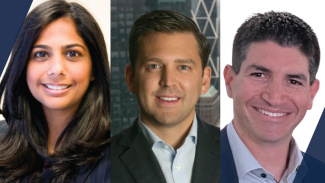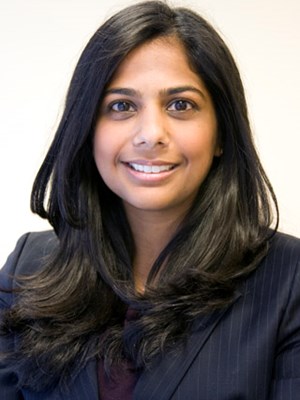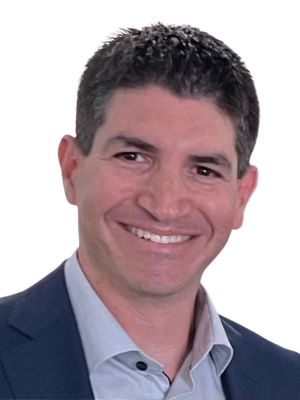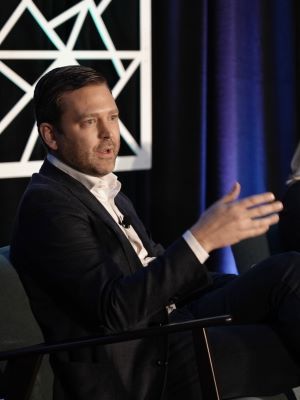Investment Insiders: Three Alums Leading the Charge in Private Equity

The private equity industry has expanded rapidly in the past 10 years, outnumbering publicly held companies and driving profit, entrepreneurship, and innovation. Meet three Ross School of Business alums innovating in the field and changing the competitive landscape.
Saleena Goel, BBA ’96; Evan Goldman, BBA ’98; and Robert Kalsow-Ramos, BBA ’08, have decades of combined experience in private equity. Since starting their careers, the three Michigan Ross alums have built teams from the ground up and participated in numerous successful investments.
Over the years, private equity has become well known for its investors' ability to drastically increase the value of investment companies. As a result, getting into the industry, particularly at a top firm, has become highly competitive. The pressure and exciting atmosphere of working on large deals and with interesting companies continue to draw some of the strongest candidates in the industry year after year. For Goel and Goldman, this high-stakes environment is a challenge they love finding ways to tackle again and again as they continue to seek investment solutions for clients and transform businesses into vehicles capable of making huge positive impacts on the world.
To learn more about what it’s like to have a career in private equity, how to get started, and what traits make a strong investor, we asked Goel, Goldman, and Kalsow-Ramos to tell us a little about their careers at Kohlberg Kravis Roberts & Co., TowerBrook Capital Partners LP, and Apollo Global Management Inc.
 Saleena Goel, BBA ’96
Saleena Goel, BBA ’96
Partner and head of customized portfolio solutions, Kohlberg Kravis Roberts
How did you get into private equity?
Despite entering the University of Michigan with a plan of becoming a corporate lawyer, it was at Ross that I decided upon a career in private equity. When I was a junior in the business school, it was actually one of my professors who first suggested that I consider investment banking. I was able to secure an internship on Wall Street that summer at Donaldson, Lufkin, and Jenrette through a program that was recruiting on campus. It turned out that DLJ had a generalist program staffing analysts for both its investment banking and private equity groups.
At the time, I did not even know the difference between private equity and investment banking. By chance, the first deal I was assigned to was in the private equity group, and I was hooked. Through that experience, it became clear to me that I am an investor. I enjoy evaluating investment opportunities and owning the outcomes, and I liked the pace and the responsibility I was given. I leveraged that summer experience into a few other private equity offers and decided to return to DLJ upon graduation, where I developed strong relationships that are still meaningful to me to this day. Since then, I have stayed on the investment side, including most recently at Kohlberg Kravis Roberts for the past 14 years.
What does a typical day look like for you?
As for many, there is no typical work day for me, but it usually starts early with my family and ends late with a prayer of gratitude. In between is a color-coded calendar full of meetings, trips, and to-dos.
What are some of the challenges you face in your industry that people may not know about?
One of the key challenges for the industry broadly is the pace of change we are experiencing. Of course, this presents opportunities as well. But, with such fast-paced change, as leaders, it’s important to be nimble and adapt to new environments while also maintaining our core principles.
What is one of your proudest accomplishments in your career so far?
One of my proudest career accomplishments so far is being the founder of the customized portfolio solutions business at KKR. I developed the idea as we were emerging from the global financial crisis, and today, it is a meaningful business that has delivered top returns since its inception. As an investor, I think it’s an honor when someone entrusts us with their capital, and I take that responsibility very seriously. Having the opportunity to design customized investment solutions for our clients while always keeping their ultimate beneficiaries in mind is important work to me and one of the most rewarding aspects of my job.
What traits, skills, or experiences do you think make a great investor?
Great investors are not taught but learn through experience, and they excel at pattern recognition. They must be comfortable with making hard calls and have the grit to keep going or pivot when things don't always turn out as planned. I think great investors are good at building relationships centered around trust. I find that they are disciplined, self-aware of their blind spots, and humble enough to keep learning.
What advice do you have for students or alums looking to further their careers at a private equity firm?
Many people focus on building relationships with those who are more senior than them. I always suggest investing just as much time in developing relationships with peers. Cultivating these relationships can provide meaningful, long-lasting opportunities as you learn about and develop your careers through similar experiences. The peers you work with today are likely to be the senior leaders you will interact with in the future. If you have developed strong and organic relationships with your peers from the beginning, you’ll find that having that common starting point will be an invaluable bond later in life and will pay perpetual dividends. This has certainly been true for me, and I am grateful for these relationships, both personally and professionally.
 Evan Goldman, BBA ’98
Evan Goldman, BBA ’98
Managing director, TowerBrook Capital Partners
How did you get into private equity?
When I started college, I barely knew what private equity was beyond what had been depicted in Barbarians at the Gate. Being very analytical and curious about the dealmaking world, I pursued a finance and accounting concentration at Michigan Ross, knowing these skills would provide the foundation for a future career on Wall Street.
As is still typical, my path to private equity started in investment banking. Leveraging the strong U-M alum network at the firm, I was able to secure a summer internship at Donaldson, Lufkin, and Jenrette after my junior year and turned that into a full-time analyst role in New York City after graduating from Ross. I was fortunate to be in the generalist pool, which gave me the opportunity to work on several transactions with DLJ Merchant Banking Partners, the firm’s in-house private equity business. I found the work incredibly interesting and loved being able to act like a principal rather than just an advisor and really dig into the companies we were investing in.
Knowing that I wanted to eventually pursue an MBA, I thought it would serve me well to get a broader experience. So, I left DLJ and joined a newly established private equity group within Soros Fund Management LLC at the height of the dot-com bubble. I was given enormous responsibility and gained experience across industries and the investment lifecycle, from growth equity to traditional buyouts. After a two-year associate program, I left Soros to attend Harvard Business School to build on my undergraduate experiences from Ross and returned to the firm after graduation.
Soon after, our team spun out to form TowerBrook as an independent middle-market private equity firm. It’s been a fantastic journey since, and I’ve been fortunate to work with exceptionally talented colleagues (including many U-M grads) as we have grown the firm, added new investment vehicles, and become the first mainstream private equity firm to be granted B Corp status, signifying our commitment to responsible ownership. Today, I oversee much of our healthcare investment activities. Beyond generating returns for our investors, I take considerable pride in the fact that our capital can be used to transform businesses that ultimately improve the U.S. healthcare system.
As I think back, my time at Ross, both in and outside the classroom, was pivotal in setting me up for the career success that I have had.
What does a typical day look like for you?
There really is no such thing as a typical day. No two days are alike, and the diversity of the work is one of the things I love most about my job. One day, I may be traveling to a board meeting for one of my portfolio companies. The next day, I may be attending an industry conference and meeting with bankers, executives, or companies that align with one of the investment theses we are exploring. Or, I may be in the office reviewing a financial model with my team, debating the merits of a transaction with my partners during our weekly investment committee meetings, or negotiating a purchase agreement or executive compensation package.
Between sitting on multiple boards, having responsibility for several portfolio companies, and searching for new investment opportunities, there are often not enough hours in the day. The key is to prioritize, not get distracted, and leverage my teams as best possible.
What are some of the challenges you face in your industry that people may not know about?
I’m not sure this is a big secret, but over the past 20-30 years, the private equity industry has become increasingly and fiercely competitive. In many respects, capital has become a commodity. There are countless firms chasing the same opportunities. Figuring out creative ways to differentiate one’s capital is critical to achieving success in our industry. At the same time, the spotlight on private equity continues to get brighter – from regulators, politicians, and even some of the largest limited partners that invest in private equity and other alternative asset classes. As a result, it’s becoming increasingly important to focus our efforts not just on generating the highest returns but doing so in a responsible and sustainable manner for all stakeholders.
What is one of your proudest accomplishments in your career so far?
Perhaps my proudest accomplishment is my longevity at the same firm. I joined what became TowerBrook over 24 years ago, only two years out of Michigan Ross. At a time when it’s common to move around frequently, I have stayed the course. Over that time, I have seen colleagues come and go, I have lived through up and down markets, and I’ve been part of some very successful investments.
What I most cherish, however, is being part of building TowerBrook from the ground up and watching the firm's continued growth and evolution. Along the way, I have built enduring relationships and have had the opportunity to mentor several of our junior professionals (notably a few Ross alums) and help them navigate their own paths in our business.
What traits, skills, or experiences do you think make a great investor?
Intellectual curiosity, proactivity, and creativity are incredibly important in the investment business, as is the ability to form relationships and understand the human dynamics of any investment. The numbers can only tell so much of the story. At the end of the day, as investors, we are relying on our management teams to run the businesses we invest in. Without great managers at the helm, executing against even the most compelling investment thesis may prove challenging. Being a good judge of talent is, therefore, critical to being a good private equity investor.
While most senior professionals in our industry have come up through the finance route, there is something to be said for having real operating experience inside of a business. It’s also important to exhibit discipline throughout the investment process and not let personal emotions get in the way of making objective, balanced decisions. It’s often very easy to fall in love with your own deals. But, truly maintaining objectivity and understanding not only upside potential but also downside risk is imperative to generating attractive returns for our investors. Finally, I can’t stress enough the importance of learning from past experiences and not making the same mistake twice.
What advice do you have for students or alums looking to further their careers at a private equity firm?
Figure out what you are good at and what you are passionate about, and pursue opportunities that will allow you to leverage both. Find your niche and do whatever you can to differentiate your personal brand. There are so many types of firms out there across the private equity and alternative asset landscape. Find a place that fits your work style and interests and values what you bring to the table. Most importantly, be proactive. Network with those in the industry. Seek mentorship. And don’t be afraid to take risks, particularly early in your career.
 Robert Kalsow-Ramos, BBA ’08
Robert Kalsow-Ramos, BBA ’08
Partner - private equity, Apollo Global Management
How did you get into private equity?
Growing up, my extended family included a number of entrepreneurs and small business owners. Spending time with them fueled my interest in business and curiosity to better understand the economy, markets, and investing. While an undergraduate, I used internships to explore a range of different areas within finance and academia, from wealth management to actuarial work at an insurance company to the American Customer Satisfaction Index at Ross. Investment banking became a natural evolution of my interests and experiences, and I joined Morgan Stanley upon graduation. Ultimately, my desire to invest and more directly support the growth and transformation of businesses led me to join Apollo in 2010.
What does a typical day look like for you?
I am based in New York City and frequently travel to spend time with our investors, existing portfolio companies, and new relationships. Our investment focus is on complex transactions at scale, and with the flexibility of our investment mandate and integration of our global platform, every day is different. Fundamentally, much of what we do is collaboratively develop creative solutions to significant strategic and financial problems and opportunities. Outside of Apollo, family and community service are very important to me. I have two young children and serve as co-chair of the board of directors of the TEAK Fellowship, a non-profit organization that helps talented students from low-income families achieve their potential.
What are some of the challenges you face in your industry that people may not know about?
The industry has been the beneficiary of a number of tailwinds over the last 15 years – namely low rates, strong economic growth, and a supportive valuation and leverage lending environment. Many of those tailwinds are now headwinds and we are frankly in much more of a ‘normal’ environment with the benefit of context and history. Firms that rode this momentum trade are now faced with more fundamental challenges and questions around their investment and value creation approaches. While we are not perfect, we have been consistent in our approach to private equity – focusing on investing in great businesses at fair prices and driving value creation through more controllable and durable means. This market shift will necessitate creative solutions to support deleveraging, value-creation, and monetization of portfolios and give way to what I think will be an attractive investment environment in the years ahead.
What is one of your proudest accomplishments in your career so far?
In late 2019, we committed to make a $3.75 billion equity investment in a technology distribution business called Tech Data Corp. It was a complex transaction where we developed a unique thesis around value creation and created an innovative structure to finance the deal. Despite the challenges of the COVID-19 pandemic and a topping bid from Warren Buffet, we completed the deal in mid-2020. Over the last four years, we worked closely with management to drive growth and innovation and supported a transformative merger with TD SYNNEX that created a new industry leader and Fortune 100 company. We exited the investment in April of this year, delivering a great outcome for our investors and having had a hand in reshaping the industry.
What traits, skills, or experiences do you think make a great investor?
The best investors are disciplined, open-minded, and creative while also being systematic. They have a nose for opportunity, a keen understanding of risk, and the ability to fail fast, adapt, and embrace change. They surround themselves with great teams and lead from the front.
What advice do you have for MBA students looking to further their career at a private equity firm?
Private equity firms have a broad range of models, strategies, and cultures. They operate as an integrated ecosystem where close collaboration between external stakeholders and internal functions is critical to their success. Opportunities within private equity firms are broad and can range from fundraising and marketing to investment management and operations, among others. Spending the time to understand these firm and professional differences and reflecting on your own interests and skills will give way to a better long-term match. Lastly and perhaps most importantly, relationships matter. They will be fundamental to breaking into the industry, your professional development, and ultimately, your success as an investor and executive. Thoughtfully invest in people, leverage your mentors, and build your network.







